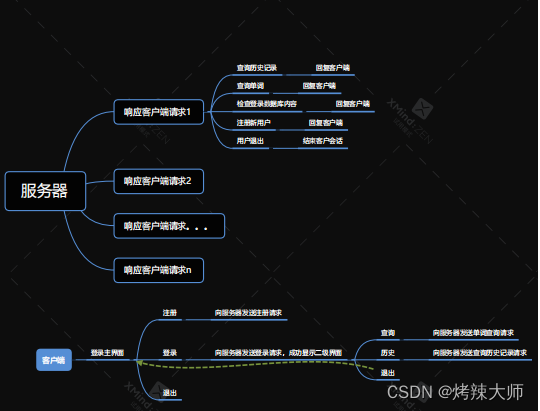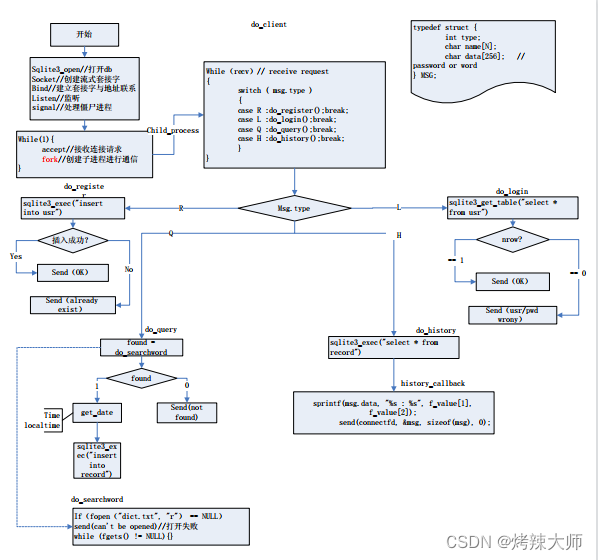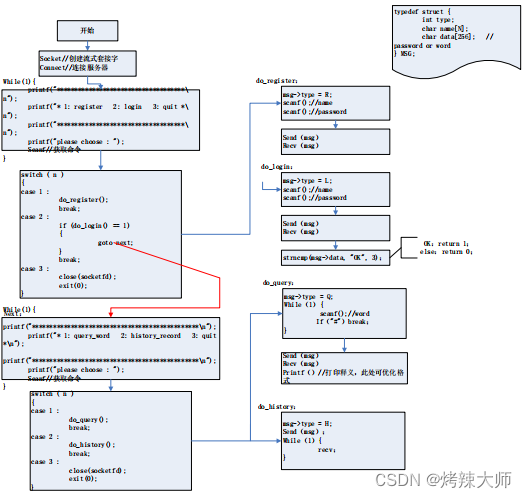一,概述
基于C语言的网络电子词典项目,使用到了tcp协议的并发服务器设计、网络编程、文件I/O、数据库等多方面的知识。可以满足多用户同时登陆,用户登陆后可以查询单词及历史记录,具有查找快速,保密性好等优点。
开发工具: Linux平台GCC交叉编译环境
功能描述:
1、可进行用户注册、登录
2、可对用户查找的单词进行存储,放入SQLite数据库中,对历史记录进行查询。
3、可进行查看和修改用户信息,包括用户名,密码等
4、分为客户端和服务器端,客户端进行用户的注册登录和查找单词等操作,服务器端进行操作数据库,进行存储和查找
项目框架

二,需求分析
1.注册:若用户名已经注册过,可重新注册
2.登录:用户名或密码错误需重新登录
3.查询:输入要查的单词,#键结束查询
4.历史:可以查询当前用户历史查找过的单词
5.退出:退出在线词典
server服务端(流程图)

client客户端

三,项目流程
1.首先搭建一个tcp客户端,一级界面包含组成、登录、退出,二级界面包含单词查询、历史记录、退出。
2.由客户端首先进入注册界面,输入注册的账号和密码,账号和密码就传入到user数据库中保存。再进入登录界面,输入账号和密码,当匹配到user数据库中有相同的账号和密码的时候,就进入二级界面。选择单词查询,输入查询的单词后,匹配dict数据库中的单词,找到该单词后返回单词在数据库中的注释,同时记录进去一条历史记录。选择历史记录,就可调出本次查询的单词、查询时间等信息。选择退出后结束该程序。
四,实战代码:
(1)客服端开发:
主程序
int main(int argc, const char *argv[])
{
int sockfd;
int n;
MSG msg;
if(argc != 3)
{
printf("Usage:%s serverip port.\n", argv[0]);
return -1;
}
if((sockfd = socket(AF_INET, SOCK_STREAM,0)) < 0)
{
perror("fail to socket.\n");
return -1;
}
struct sockaddr_in serveraddr;
bzero(&serveraddr, sizeof(serveraddr));
serveraddr.sin_family = AF_INET;
serveraddr.sin_addr.s_addr = inet_addr(argv[1]);
serveraddr.sin_port = htons(atoi(argv[2]));
if(connect(sockfd, (struct sockaddr *)&serveraddr, sizeof(serveraddr)) < 0)
{
perror("fail to connect");
return -1;
}
char buf[100];
while(1)
{
printf("*****************************************************************\n");
printf("* 1.register 2.login 3.quit *\n");
printf("*****************************************************************\n");
printf("Please choose:");
fgets(buf, sizeof(buf), stdin);
n = atoi(buf);
switch(n)
{
case 1:
do_register(sockfd, &msg);
break;
case 2:
if(do_login(sockfd, &msg) == 1)
{
goto next;
}
break;
case 3:
close(sockfd);
exit(0);
break;
default:
printf("Invalid data cmd.\n");
}
}
next:
while(1)
{
printf("*****************************************************\n");
printf("* 1.query_word 2.history_record 3.quit *\n");
printf("*****************************************************\n");
printf("Please choose:");
fgets(buf, sizeof(buf), stdin);
n = atoi(buf);
switch(n)
{
case 1:
do_query(sockfd, &msg);
break;
case 2:
do_history(sockfd, &msg);
break;
case 3:
close(sockfd);
exit(0);
break;
default :
printf("Invalid data cmd.\n");
}
}
return 0;
}函数——注册
//注册
int do_register(int sockfd, MSG *msg)
{
msg->type = R;
printf("Input name:");
scanf("%s", msg->name);
getchar();
printf("Input passwd:");
scanf("%s", msg->data);
getchar();
if(send(sockfd, msg, sizeof(MSG),0) < 0)
{
printf("fail to send.\n");
return -1;
}
if(recv(sockfd, msg, sizeof(MSG), 0) < 0)
{
printf("Fail to recv.\n");
return -1;
}
// ok ! or usr alread exist.
printf("%s\n", msg->data);
return 0;
}函数——登录
//登陆
int do_login(int sockfd, MSG *msg)
{
msg->type = L;
printf("Input name:");
scanf("%s", msg->name);
getchar();
printf("Input passwd:");
scanf("%s", msg->data);
getchar();
if(send(sockfd, msg, sizeof(MSG),0) < 0)
{
printf("fail to send.\n");
return -1;
}
if(recv(sockfd, msg, sizeof(MSG), 0) < 0)
{
printf("Fail to recv.\n");
return -1;
}
if(strncmp(msg->data, "OK", 3) == 0)
{
printf("Login ok!\n");
return 1;
}
else
{
printf("%s\n", msg->data);
}
return 0;
}
登录——查询
//查询
int do_query(int sockfd, MSG *msg)
{
msg->type = Q;
puts("--------------");
while(1)
{
printf("Input word:");
scanf("%s", msg->data);
getchar();
//客户端,输入#号,返回到上一级菜单
if(strncmp(msg->data, "#", 1) == 0)
break;
//将要查询的单词发送给服务器
if(send(sockfd,msg, sizeof(MSG), 0) < 0)
{
printf("Fail to send.\n");
return -1;
}
// 等待接受服务器,传递回来的单词的注释信息
if(recv(sockfd, msg,sizeof(MSG), 0) < 0)
{
printf("Fail to recv.\n");
return -1;
}
printf("%s\n", msg->data);
}
return 0;
}
函数——历史
//历史
int do_history(int sockfd, MSG *msg)
{
msg->type = H;
send(sockfd, msg, sizeof(MSG), 0);
// 接受服务器,传递回来的历史记录信息
while(1)
{
recv(sockfd, msg, sizeof(MSG), 0);
if(msg->data[0] == '\0')
break;
//输出历史记录信息
printf("%s\n", msg->data);
}
return 0;
}
服务器开发:
主程序
//0主函数
int main(int argc, const char *argv[])
{
int sockfd;
struct sockaddr_in serveraddr;
int n;
MSG msg;
sqlite3 *db;
int acceptfd;
pid_t pid;
char *errmsg;
if(argc != 3)
{
printf("Usage:%s serverip port.\n", argv[0]);
return -1;
}
/*************************************************/
//打开数据库
if(sqlite3_open(DATABASE, &db) != SQLITE_OK)
{
printf("%s\n", sqlite3_errmsg(db));
return -1;
}
else
printf("open DATABASE success.\n");
if(sqlite3_exec(db,
"create table if not exists usr(name text primary key,pass text);",
//primary key主关键字只能有一个
NULL, NULL, &errmsg) != SQLITE_OK)
{
printf("%s\n", errmsg);
}
else
printf("Create or open usr table success.\n");
if(sqlite3_exec(db,
"create table if not exists record(name text ,data text,word text);",
NULL, NULL, &errmsg) != SQLITE_OK)
{
printf("%s\n", errmsg);
}
else
printf("Create or open record table success.\n");
/*************************************************/
if((sockfd = socket(AF_INET, SOCK_STREAM,0)) < 0)
{
perror("fail to socket.\n");
return -1;
}
bzero(&serveraddr, sizeof(serveraddr));
serveraddr.sin_family = AF_INET;
serveraddr.sin_addr.s_addr = inet_addr(argv[1]);
serveraddr.sin_port = htons(atoi(argv[2]));
if(bind(sockfd, (struct sockaddr *)&serveraddr, sizeof(serveraddr)) < 0)
{
perror("fail to bind.\n");
return -1;
}
// 将套接字设为监听模式
if(listen(sockfd, 5) < 0)
{
printf("fail to listen.\n");
return -1;
}
//处理僵尸进程
signal(SIGCHLD,sig_child_handle);
while(1)
{
if((acceptfd = accept(sockfd, NULL, NULL)) < 0)
{
perror("fail to accept");
return -1;
}
if((pid = fork()) < 0)
{
perror("fail to fork");
return -1;
}
else if(pid == 0) // 儿子进程
{
//处理客户端具体的消息
close(sockfd);
do_client(acceptfd, db);
}
else // 父亲进程,用来接受客户端的请求的
{
close(acceptfd);
}
}
return 0;
}函数——登录进入
//1登陆
int do_client(int acceptfd, sqlite3 *db)
{
MSG msg;
while(recv(acceptfd, &msg, sizeof(msg), 0) > 0)
{
printf("type:%d\n", msg.type);
switch(msg.type)
{
case R:
do_register(acceptfd, &msg, db);
break;
case L:
do_login(acceptfd, &msg, db);
break;
case Q:
do_query(acceptfd, &msg, db);
break;
case H:
do_history(acceptfd, &msg, db);
break;
default:
printf("Invalid data msg.\n");
}
}
printf("client exit.\n");
close(acceptfd);
exit(0);
return 0;
}
函数——注册
//2注册
void do_register(int acceptfd, MSG *msg, sqlite3 *db)
{
char * errmsg;
char sql[500];
sprintf(sql, "insert into usr values('%s', %s);", msg->name, msg->data);
printf("%s\n", sql);
if(sqlite3_exec(db,sql, NULL, NULL, &errmsg) != SQLITE_OK)
{
printf("%s\n", errmsg);
strcpy(msg->data, "usr name already exist.");
}
else
{
printf("client register ok!\n");
strcpy(msg->data, "OK!");
}
if(send(acceptfd, msg, sizeof(MSG), 0) < 0)
{
perror("fail to send");
return ;
}
return ;
}
函数——登录
//3登陆
int do_login(int acceptfd, MSG *msg , sqlite3 *db)
{
char sql[500] = {};
char *errmsg;
int nrow;
int ncloumn;
char **resultp;
sprintf(sql, "select * from usr where name = '%s' and pass = '%s';", msg->name, msg->data);
printf("%s\n", sql);
if(sqlite3_get_table(db, sql, &resultp, &nrow, &ncloumn, &errmsg)!= SQLITE_OK)
{
printf("%s\n", errmsg);
return -1;
}
else
printf("get_table ok!\n");
// 查询成功,数据库中拥有此用户
if(nrow == 1)
{
strcpy(msg->data, "OK");
send(acceptfd, msg, sizeof(MSG), 0);
return 1;
}
if(nrow == 0) // 密码或者用户名错误
{
strcpy(msg->data,"usr/passwd wrong.");
send(acceptfd, msg, sizeof(MSG), 0);
}
return 0;
}函数——查询
//3查询
int do_query(int acceptfd, MSG *msg , sqlite3 *db)
{
char word[64];
int found = 0;
char date[128] = {};
char sql[500] = {};
char *errmsg;
//拿出msg结构体中,要查询的单词
strcpy(word, msg->data);
found = do_searchword(acceptfd, msg, word);
printf("查询一个单词完毕.\n");
// 表示找到了单词,那么此时应该将 用户名,时间,单词,插入到历史记录表中去。
if(found == 1)
{
//需要获取系统时间
get_date(date);
sprintf(sql, "insert into record values('%s','%s','%s')",msg->name,date, word);
if(sqlite3_exec(db, sql, NULL, NULL, &errmsg) != SQLITE_OK)
{
printf("%s\n", errmsg);
return -1;
}
else
{
printf("Insert record done.\n");
}
}
else //表示没有找到
strcpy(msg->data, "Not found!");
// 将查询的结果,发送给客户端
send(acceptfd, msg, sizeof(MSG), 0);
return 0;
}
函数——打开文件查词
//3.1打开文件查词
int do_searchword(int acceptfd, MSG *msg, char word[])
{
FILE * fp;
int len = 0;
char temp[512] = {};
int result;
char *p;
if((fp = fopen("dict.txt", "r")) == NULL)
{
perror("fail to fopen.\n");
strcpy(msg->data, "Failed to open dict.txt");
send(acceptfd, msg, sizeof(MSG), 0);
return -1;
}
//打印出,客户端要查询的单词
len = strlen(word);
printf("%s , len = %d\n", word, len);
//读文件,来查询单词
while(fgets(temp,512, fp) != NULL)
{
// printf("temp:%s\n", temp);
// abandon ab
result = strncmp(temp,word,len);
if(result < 0)
continue;
if(result > 0 || ((result == 0) && (temp[len]!=' ')))
break;
// 表示找到了,查询的单词
p = temp + len; // abandon v.akdsf dafsjkj
// printf("found word:%s\n", p);
while(*p == ' ')
p++;
strcpy(msg->data, p);
printf("found word:%s\n", msg->data);
// 注释拷贝完毕之后,应该关闭文件
fclose(fp);
return 1;
}
fclose(fp);
return 0;
}函数——获得日期
//3.2获得日期
int get_date(char *date)
{
time_t t;
struct tm *tp;
time(&t);
//进行时间格式转换
tp = localtime(&t);
sprintf(date, "%d-%d-%d %d:%d:%d", tp->tm_year + 1900, tp->tm_mon+1, tp->tm_mday,
tp->tm_hour, tp->tm_min , tp->tm_sec);
printf("get date:%s\n", date);
return 0;
}
函数——查询历史
//4.查询历史
int do_history(int acceptfd, MSG *msg, sqlite3 *db)
{
char sql[128] = {};
char *errmsg;
sprintf(sql, "select * from record where name = '%s'", msg->name);
//查询数据库
if(sqlite3_exec(db, sql, history_callback,(void *)&acceptfd, &errmsg)!= SQLITE_OK)
printf("%s\n", errmsg);
else
printf("Query record done.\n");
// 所有的记录查询发送完毕之后,给客户端发出一个结束信息
msg->data[0] = '\0';
send(acceptfd, msg, sizeof(MSG), 0);
return 0;
}
函数——历史结果--回调函数 得到查询结果,并且需要将历史记录发送给客户端
//4.1历史结果--回调函数
// 得到查询结果,并且需要将历史记录发送给客户端
int history_callback(void* arg,int f_num,char** f_value,char** f_name)
{
// record , name , date , word
int acceptfd;
MSG msg;
acceptfd = *((int *)arg);
sprintf(msg.data, "%s , %s", f_value[1], f_value[2]);
send(acceptfd, &msg, sizeof(MSG), 0);
return 0;
}






















 2312
2312











 被折叠的 条评论
为什么被折叠?
被折叠的 条评论
为什么被折叠?








